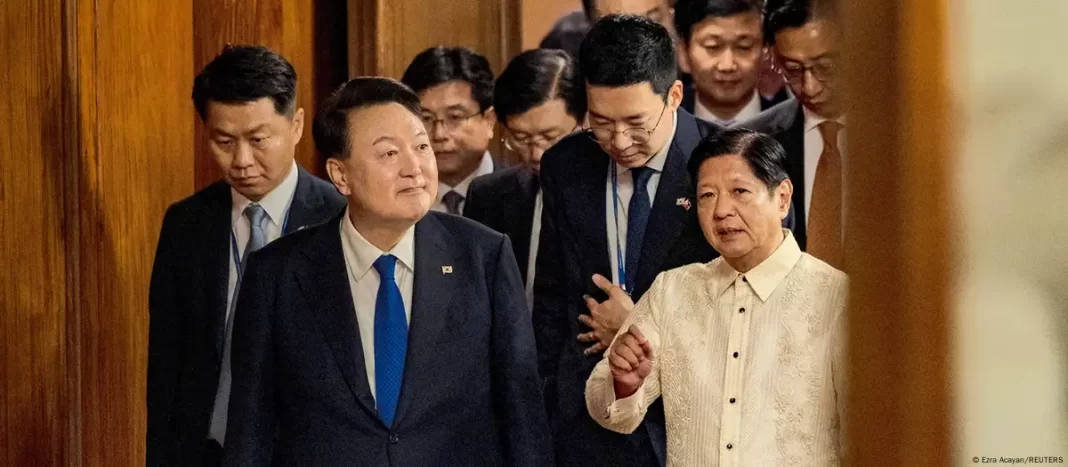South Korea’s President Yoon Suk Yeol made an important state visit to the Philippines on Monday, where he and President Ferdinand Marcos Jr. announced a major upgrade in the relationship between their two countries. Both leaders highlighted the deepening of ties, calling it a “strategic partnership.” This new agreement includes enhanced cooperation in defense, security, and a shared commitment to maintaining peace in the region.
A Strategic Partnership to Tackle Geopolitical Challenges
The announcement of a “strategic partnership” marks a significant step for both nations. President Marcos opened the discussions by emphasizing the need for stronger alliances as geopolitical tensions grow.
In his opening remarks, Marcos said, “We must cooperate to achieve prosperity for our peoples and to promote a rules-based order governed by international law, as the geopolitical environment is only getting more complex.”
This move reflects the increasing complexity of the global political landscape, where nations are looking to build stronger bonds to safeguard their interests. By forming this partnership, South Korea and the Philippines aim to ensure stability and development, especially in defense and security.
Addressing Regional Security Concerns
One of the main drivers of this new partnership is the increasing aggression from neighboring countries. For the Philippines, tensions in the South China Sea have been a major issue, as China continues to assert its claims in the contested waters. The South China Sea is not only a vital trade route but also an area rich in natural resources, making it a focal point for regional disputes.
South Korea, on the other hand, faces persistent threats from North Korea. Pyongyang has recently ramped up its nuclear threats against Seoul, raising concerns about the stability of the Korean Peninsula. North Korea’s ongoing military provocations, including its nuclear weapons program, pose a serious threat not only to South Korea but to the broader Indo-Pacific region.
Calls for Peace and Stability in Troubled Waters
During the state visit, President Yoon expressed his concerns about peace in the South China Sea. He emphasized that maintaining peace and stability in the region is crucial. “We must ensure that this vital waterway remains open and secure, as it is essential for global trade and regional security,” Yoon stressed.
He also reiterated that the international community should not condone North Korea’s nuclear programs and provocative actions. “The international community will never condone North Korea’s nuclear programs and its reckless provocations, as well as its illegitimate military cooperation with Russia,” Yoon stated firmly.
This cooperation with Russia has raised alarms across the region, as it may further destabilize the Korean Peninsula.
Defense Ties to Counter Regional Threats
In addition to focusing on peace and stability, the two leaders discussed expanding military cooperation. Yoon pledged South Korea’s support in upgrading the Philippines’ military capabilities. This includes providing assistance with military technology and equipment to help the Philippines counter growing threats from neighboring nations.
This is not the first time that the Philippines has sought stronger defense ties with other countries. In fact, last month, President Marcos secured a defense agreement with Vietnam to counter Chinese intimidation in the South China Sea. The Philippines is working hard to build a network of defense partnerships to protect its interests in the region.
A Tour of Regional Diplomacy
Yoon’s visit to the Philippines marks the first leg of a six-day diplomatic tour across Southeast Asia. After his time in Manila, Yoon will travel to Singapore and Laos to attend the Association of Southeast Asian Nations (ASEAN) summit. This summit brings together leaders from across Southeast Asia to discuss pressing regional issues, including trade, security, and economic development.
South Korea’s participation in ASEAN reflects its commitment to building stronger relationships with Southeast Asian nations. The country sees ASEAN as a key partner in promoting peace and stability in the Indo-Pacific region. By strengthening ties with nations like the Philippines, South Korea is positioning itself as a leader in regional diplomacy and security.
Looking to the Future
The upgraded partnership between South Korea and the Philippines sets the stage for even greater collaboration in the future. As both nations face increasing security challenges, their alliance will be crucial in maintaining peace and stability in the region.
This new partnership also highlights the importance of collective action in addressing regional threats. With tensions rising in the South China Sea and the Korean Peninsula, South Korea and the Philippines understand that working together is the best way to safeguard their interests.
As the geopolitical environment becomes more complex, the strengthened ties between these two nations serve as a reminder of the importance of alliances in ensuring peace and prosperity. By deepening their defense and security cooperation, South Korea and the Philippines are taking a bold step toward securing a brighter, more stable future for their people.
Way Forward
South Korea’s state visit to the Philippines marks an important moment in the relationship between the two countries. Their new strategic partnership, focused on defense and security. It will play a vital role in addressing the growing challenges in the region. With regional threats from China and North Korea looming large. Both nations are looking to each other for support. Through this strategic partnership, South Korea and the Philippines are sending a strong message. They are ready to face these challenges together, ensuring peace and stability in the Indo-Pacific region.

